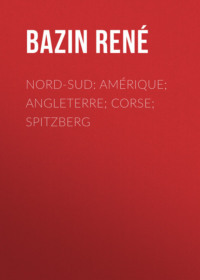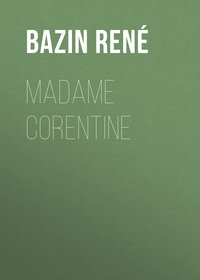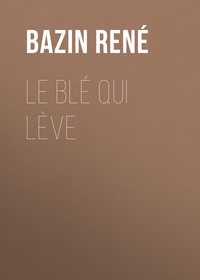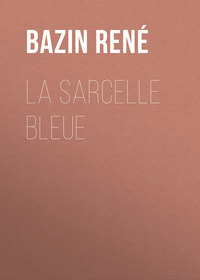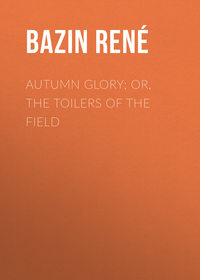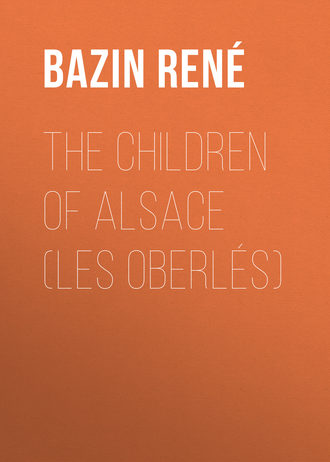 полная версия
полная версияThe Children of Alsace (Les Oberlés)
"Here we've had grand visits – oh, visits which nearly cost a scene. Imagine, two German officers came last Wednesday in a motor car to the lodge, and asked permission to see the saw-mills. Happily they were in mufti. The Alsheim people only saw two gentlemen like any others. Very fashionable; an old one – a commandant, and a young one with a grand air, and accustomed to society. If you had seen him bow to papa! I was in the park. They bowed to me too, and visited the whole of the works, personally conducted by our father. While this was going on that idiot Victor informed grandfather, who showed he was annoyed when we came in. I ought to have run away, it appears. As the gentlemen did not enter the house – 'my house,' as grandfather says – his irritation did not last long. However, there was a sequel – "
Lucienne laughed a little stifled laugh.
"My dear, Madame Bastian did not approve of me."
"You were then present during their visit to the works, when these gentlemen – "
"Yes."
"All the time?"
"My father kept me. In any case, I do not see how that should affect the Mayor's wife. But I had such a cold bow from her, my dear, last Sunday at the church door. Do you care about the Bastians' bows?"
"Yes; in the same way that I care for the greetings of all good people."
"Good people – yes; but they do not know what life is! To be blamed by them is just the same to me as if I were to be blamed by an Egyptian mummy come to life for the purpose. I should answer: 'You do not understand anything about it; go and wrap yourself up again.' Is it not strange that you do not think as I do – you, my brother?"
Jean stroked the hand which was raised in front of him to make a screen.
"Even mummies can judge of certain things of our time, my darling – the things which are of all times."
"Oh! how serious you are. Come now, where was I wrong? Was it in going for a walk? In not looking away? In answering a greeting? In obeying my father, who told me to come and stay?"
"No; assuredly not!"
"What harm have I done?"
"None. I have danced with many German girls. You can acknowledge an officer's greeting."
"Then I did right?"
"As a fact, yes. But there are so many sorrows around us – real sorrows, and so noble. You must remember that they all come to life again at a word, or a gesture."
"I shall never consider that. Since what I do is not wrong, no one shall ever stop me. Do you hear?"
"That is where we differ, Lucienne. It is not so much in our ideas; it is in a whole range of feelings which your education prevents you from possessing."
He kissed her, and the conversation wandered to different topics.
CHAPTER VII
THE EASTER VIGIL
The weather had settled fine. Jean found the plain of Alsace in full spring glory.
However, he only felt a faint and mixed pleasure in the sight he had longed for. He came back from this excursion more upset than he cared to own to himself. It had revealed to him the opposition of the two nations – that is to say, of two minds, the persistent memory of many of the poor, and the difficulty they found to make a livelihood which their prudent and even hidden opinions created for them. He understood better now how difficult a part his would be to play in the family, at the works, in the village, in Alsace.
The pleasure he felt the morning after his return at his father's congratulations on the report of the forest cultivation by the House of Oberlé made only a short diversion in the midst of this worry. He tried in vain to appear quite happy, and he duly deceived those whose interest it was to be deceived.
"My Jean," said his mother, kissing him as he was going to sit down to breakfast, "I think you look splendid. The strong Alsheim air agrees with you, and also being near your poor mamma!"
"Fancy that!" said Lucienne, "and I thought him very gloomy!"
"Business," explained M. Joseph Oberlé, turning towards the window where his son was sitting, "cares of business. He has handed me a report, on which I must congratulate him publicly; it is very well drawn up, very clear, and the result of which will be that I shall economise, in four places at least, in the transport of my trees. You understand, father?"
The grandfather made a sign with his head. But he finished writing something on the slate, and showed it to his daughter-in-law.
"Has he already seen the country weep?"
Madame Monica rubbed the sentences out quickly with her fingers. The others looked at her, and all were uneasy, as if there had been some painful explanation between them.
Jean again experienced that intimate sorrow for which there is no remedy. All the afternoon he worked in the office at the saw-mills, but he was distracted and dreamy. He reflected that Lucienne would go away one day, and that nothing would be altered; that the grandfather might disappear also, and that the division would still go on. All the plans that he had had when far away, the hope of being himself a diversion, of bringing peace, of uniting them or of giving them an appearance of union: all that appeared childish to him now. He saw that Lucienne had spoken truly when she made fun of his illusions.
No, the evil was not in his family, it was in the whole of Alsace. Even if no one of his name lived at Alsheim, Jean Oberlé would meet at his door, in the village, among his workmen, his clients, and his friends the same annoyance at certain moments, always the same question. Neither his will nor any will like his could deliver his race, either now or later.
In this melancholy mood the idea of seeing Odile again, and making her love him, came back to him and took possession of his mind. Who else besides Odile could make life at Alsheim acceptable to him, and bring back his scattered and suspicious friends, and re-establish the name of Oberlé in the esteem of "Old Alsace"? He saw now that she was more than a pretty woman towards whom his youthful heart went out in song; he saw in her peace and dignity, and the only strength possible in the difficult future which awaited him.
She was the brave and faithful creature whom he needed here.
How to tell her? How to find an opportunity to speak freely to her, without the risk of being surprised, and troubling this orderly and jealous family? Evidently not at Alsheim. Then where should he arrange to meet her? And how could he forewarn her?
Jean thought of this all the evening.
The next day, Maundy Thursday, was the day on which in Catholic churches the Tomb would be decorated with flowers, branches of trees, materials, and torches placed in ledges, where the faithful hasten to adore the Host. It was beautiful weather, clear, even too clear for the time of year, when clearness calls up mist or rain.
After he had talked with his mother and Lucienne in M. Philippe Oberlé's room – it was the first time that he had felt that his home held a family – Jean went towards the orchards, which are behind the houses of Alsheim, and followed the road which he had taken a few weeks ago to call on the Bastians. But a little beyond the Ramspachers' farm he took the path which up to there ran at right angles to the avenue, and was now parallel with it, and with it joined the village road. He came out on to a piece of waste land, used for carts by many farmers on the plain. The neighbouring fields were deserted. The road was partially screened by a bank of earth planted with hazel-trees. Jean walked along the quick-set hedge which ran round the Bastians' property, approached the village, and came back again. He waited. He hoped that Odile would soon come into the path on the other side of the hedge to go to the Alsheim church to pray at the Tomb.
The remembrance of former meetings, at the same place and on the same day, had come into his mind, and had decided him. As he began the walk for the third time he saw what he had not seen at first.
"How wonderful," he said to himself. "The road was made for her!"
At the end of the avenue, for more than two hundred yards in front, the fence, the clumps of trees, a small portion of the long roof appeared in a marvellous frame.
The old cherry-trees had flowered all together in the same week with the almond-trees and the pear-trees. The pear-trees blossom in clusters, the almond-trees in stars; as for the wild cherry-trees, from the forest transplanted to the plain – they blossom into white distaffs of bloom.
Round the substantial branches, swollen and coloured red with sap, thousands of white corollas like a drift of snowflakes, trembled on their fragile stalks, and so thick were they that in many places one could not see the branch itself. Every tree cast its flowery spindles in all directions. So many of the cherry-trees were old that from one side of the avenue to the other the points of the flowering branches touched and intermingled. A swarm of bees covered them with hovering wings. A subtle odour of honey floated in waves down the avenue, and was wafted on the wind far away to the plain, to the fields, to the scarcely covered ground surprised by this feeling of spring. There were no trees in the large open valley which could vie with these for splendour – only to the right – and quite close, the four walnut-trees of the Ramspachers had begun to show their leaves, and seemed with their heavy branches to be enamels encrusting the farm walls.
The minutes passed by – the petals of the cherry-blossoms fell in showers. And lo, here is a woman stooping to unlatch the gate – it is she! She stands erect, and walks onwards in the middle of the path, between its two borders of grass – quite slowly, for she is gazing upwards. She is looking at the white blossoms which are open. The idea of a bride's wedding wreath, an idea so familiar to young girls, passes through her mind. Odile does not smile, only her face beams with an uplifted look, and an involuntary stretching out of her hands gives the greeting and thanks of her youth to the joyous earth.
She goes down towards Alsheim. On her fur cap, on her rounded cheeks, on her blue cloth dress, the wild cherry-trees shed their blossoms. She is serious. In her left hand she carries a prayer book, half hidden in the folds of her skirt. She thinks she is alone.
The splendour of the day speaks to her. But there is nothing languid about her. She is a valiant creature; she is made to face life bravely. Her eyes, which seek the tree-tops, are alive and masters of her thoughts, and do not give themselves up to a tempting dream. She was drawing near, never suspecting that Jean was waiting for her. The meal-time ended, the usual noises were going on in the village of Alsheim, rumbling cart-wheels, barking dogs, voices of men, of children calling to each other, but all softened by the distance, scattered in the vast aerial space, drowned in the tide of the wind, as is the noise of a clod of earth which has become loose and falls into the sea.
As she came near, Jean took off his hat and stood up a little on the other side of the hedge. And she who walked between two walls of blossoms, although she was gazing upwards, turned her head, her glance still full of the spring which had excited her.
"Oh, is that you?" she said.
And she came at once across the strip of grass where the cherry-trees were planted, up to the place in the hedge where Jean was.
"I cannot come to you freely as I used to," he said, "so I came to wait for you. I have a favour to ask of you…"
"A favour? And you say that so seriously!" She tried to smile, but her lips refused. They had both become pale.
"I am going," said Jean, as if he was making a grave declaration; "I am going up to Sainte Odile the day after to-morrow – I shall go to hear the bells ring in Easter. If you also asked for permission to come – "
"You have made a vow?"
He answered:
"Something like it. I must speak to you – to you alone."
Odile withdrew slightly. With something of fear in her look she was trying to find out if Jean was speaking the truth – if she had guessed aright. He was watching her in an agony of anxiety. They were motionless, trembling, and so near and yet so far from each other that one would have said that they were threatening each other. And in fact both felt that the peace of their lives was at stake. They were not children, but a man and a woman of a strong and passionate race. All the powers of their being asserted themselves and broke through the hackneyed commonplaces of custom, because in these simple words, "I must speak to you," Odile had heard the breath of a soul which was giving itself, and which demanded a return.
In the deserted avenue the old cherry-trees lifted their white distaffs of blossom, and in the cup of each flower the spring sun was resting.
"The day after to-morrow?" she said, "at Sainte Odile – to hear the bells ring?"
She repeated what he had said. But that was to gain time, and to gaze deeper into those eyes fixed upon her, eyes which looked like the green depths of the forest.
There was a great calm in the plain and in the next village. The wind ceased for a moment – Odile turned away.
"I will go," she said.
Neither of them explained themselves further. A covered cart rolled along the road, not far off. A man shut the gate through which carts pass to the Bastians' farm. But the great thing was Jean had said what he had to say.
In the profound depths of their souls the words echoed and re-echoed. They were no longer alone. Both had the sacred moment of their meeting enclosed, as it were, in themselves, and they fell back on their own thoughts as the earth in the furrows does when the sowing is done, and the germinating seed is beginning to expand.
Odile went away. Jean admired the healthy and beautiful woman disappearing along the road. She walked well, without swinging her body. Above the white neck, Jean placed in imagination the big black bows of the Alsatian women who live beyond Strasburg. She no longer raised her eyes towards the cherry-trees. She let her skirt trail, and it swept the grass, making a little dust fly, and the petals of cherry blossoms, which flew about a little in the wind before dying.
The day after to-morrow was slow in coming. Jean had said to his father:
"Some pilgrims are going up to Sainte Odile on Saturday to hear the Easter bells. I have never been there at this time. If you do not mind, it is an excursion I should much like to make."
He did not mind.
Jean opened his window when he woke that morning. There was a thick fog. The fields near the house were invisible.
"You will not go in this weather?" asked Lucienne, when she saw her brother come into the dining-room, where she was drinking her chocolate.
"Yes, I shall go."
"You will see nothing."
"I shall hear."
"Is it then so extraordinary?"
"Yes."
"Then will you take me?"
She did not wish to go to Sainte Odile. Dressed in a light morning-gown trimmed with lace, and drinking her chocolate in little sips, she had no intention whatever of doing anything but stop her brother on his way and kiss him.
"Seriously, are you making a kind of pilgrimage up there?"
"Yes – a kind of – "
Bending at this moment over her cup, she did not see the quick smile which accompanied the words. She answered a little bitterly:
"You know I'm not devout. I fulfil my obligations as a Catholic but poorly, and the practices of devotion do not tempt me. But you, you have more faith than I have. I am going to tell you what you ought to ask for – it will be worth a pilgrimage, I can tell you." She changed her tone, and her voice became suddenly passionate; she raised her eyebrows, her eyes were at once self-willed and affectionate, and she said:
"You must ask for that miracle of perfection among women who will live with you here. When I am married and go away life will be terrible for you here. You will have to bear all alone the misery of the family quarrels, and the suspicions of the peasants. You will have no one to pity you. That is the part to play. Ask for some one strong enough, gay enough, and with a conscience fine enough to do it, since you would live at Alsheim. You see, my thought is that of a friend."
"Of a great friend."
They kissed each other.
"Good-bye, Pilgrim, good-bye – good luck!"
"Good-bye."
Jean got away. He was soon in the park, turned after passing through the gate, went through the hop-fields and the vineyards, and so into the forest.
The forest was also full of mist. The serried masses of pines, which took the hill as it were by storm, appeared grey from one bank of the stream to the other, and were almost immediately lost in a thick mist without sun and without shadow.
Jean did not go up the beaten track. He went gaily climbing up the woods when not too steep, and stopping sometimes to take breath and to listen if he could not catch above as below, somewhere in the mysterious and impenetrable mists of the mountain, either the voice of Odile or the chant of the pilgrims. But no; he only heard the rushing of water, or perhaps the voice of some one calling to his dog, or the timid call of some poor peasant of Obernai picking up dead sticks with his child, in spite of the regulation which allows wood-picking only on Thursdays. The saucepan must boil on Easter Sunday! And was not this fog which hid everything a divine protection against the forest guard?
Jean experienced great pleasure from this solitary, stiff climb. As he went up he thought of Odile more and more, and he was more and more glad that he had chosen this holy place of Alsace in which to meet her – and this day – doubly affecting. Everywhere around him the beautiful scalefern which carpets the rocky slopes unfolded its velvet fronds. On all last year's shoots of honeysuckle there were little leaves; the first strawberries were in flower, and the first lilies of the valley. The geraniums, which are so fine in Sainte Odile, lifted their hairy stalks, and the multitude of whortle berries and bilberries and raspberries, that is the entire undergrowth, whole fields of it, began to pour out on the breeze the perfume of their moving sap. The fog retained these few scents and kept them in like a net work on the sides of the Vosges.
Jean came close to Heidenbruch, looked at the green shutters and went on his way. "Uncle Ulrich," he murmured, "you would be glad if you saw me, and if you knew where I am going, and with whom, perhaps, I shall be presently!" Fidèle barked, half asleep, but did not come. The mountain was again deserted. A buzzard called above the mist. Jean, who had not been this way since his childhood, enjoyed the wildness and peacefulness of the place. He reached the higher part, which is the property of the bishopric of Strasburg, and followed the "pagan wall" which surrounds the summit for ten miles, that he might recall his school-boy impressions of long ago.
At midday he had passed the Männelstein rock and entered the convent courtyard, built on the mountain top, a crown of old stone placed above the summit of the pine forests; and there, although there was no crowd, he found groups of pilgrims, carriages with horses unharnessed, fastened to the trunks of ancient lime-trees, grown no one knew how at this altitude, and covering with their branches nearly the whole enclosure. Jean remembered the way; he went towards the chapels on the right. He merely passed through the first, which is painted, but stopped in the second, with elliptical arches leading to the shrine, where lies the wax figure of the patroness of Alsace, the Abbess Sainte Odile – so gentle, with her pink face, her veil, and her golden crozier, her purple mantle lined with ermine. Jean knelt down: with all the strength of his faith he prayed for his home, so sadly divided against itself, from which he felt glad to be away, and that Odile Bastian should not fail to keep this love tryst, the hour for which was so near at hand. As his was a sincere soul, he added: "Let our way be made clear to us! May we follow it together! Let us see all obstacles removed from our path!"
The whole of Alsace had knelt at the same spot for centuries.
Then he went out to the refectory, where the nuns had begun to help the first visitors. Odile was not there. After the lunch, which was very long, being continually lengthened by the arrival of fresh pilgrims, Jean went hastily to the foot of the great rock on which the convent is built, and finding once more the road which comes from Saint Nabor and passes by Sainte Odile's well, he posted himself in a thick part of the wood which overlooked a bend in the road. At his feet was the narrow strip of downtrodden earth, bare of grass and covered with pine needles, and which seemed hanging in the air. Far beyond that point the slope of the mountain became so steep that he could see no farther. In clear weather you could see to right and left two sunken wooden buttresses, but now the curtain of white mist hid everything – the abyss, the slopes, and the trees. But the wind blew and moved the mist, whose thickness, one could feel, varied from minute to minute.
It was two o'clock. In an hour the Easter bells would ring. The people who wanted to hear them could not now be far from the summit, and in the great silence Jean heard, rising upwards from below, voices blending round the bend of the wood. Then a phrase whistled: "Formez vos bataillons!" warned him that Alsatian students were near. Two young men – he who had whistled overtaken by another – came little by little out of the fog and went towards the abbey.
Then a young couple passed, the wife dressed in black, her square-cut bodice showing a white chemise, and wearing a lace cap like a helmet on her head; the man wore a flowered velvet waistcoat, a jacket with a row of copper buttons, and a fur cap.
Weissenburg peasants thought Jean.
Then he saw florid women from Alsheim and Heiligenstein pass, chattering, but not showing any trace of Alsatian dress.
Among them was a woman from the Münster valley, recognisable by her cap of dark stuff, bound round her head like the handkerchief of the southerners, and decorated in front with a red rosette. Two minutes slipped by. A step was heard through the fog, and a priest appeared – an old, heavy man, who wiped his face as he walked. Two children, very alert, doubtless the belated children of one of the women who had already gone by, overtook him, greeting him in Alsatian with the words, "Praised be Jesus Christ, M. le curé!"
"For ever and ever!" answered the priest.
He did not know them; he only spoke to them to answer the old and beautiful form of greeting. Jean, seated near a pine-tree and half hidden, heard an old man overtake the priest at the bend of the road and say, "Praised be Jesus Christ!"
How many times must that greeting have echoed through the vaults of the forest!
Jean looked before him as one in a dream, who sees only vague figures without attaching any meaning to them.
He stayed like that a short time. Then a murmur, almost imperceptible, so faint as to pass almost unheard, weaker than the twitter of a bird, was borne up on the fog: "Hail, Mary, full of grace; blessed art thou among women!" Another murmur followed, and finished with "Holy Mary, Mother of God, pray for us!" and an involuntary agitation, a mysterious certainty, preceded the appearance of two women.
They were both tall. The elder was an old spinster of Alsheim, whose face was the colour of the fog, and who lived in the shadow of the church, which she decorated on feast-days. She looked weary, but she smiled as she recited the rosary. The younger walked on the right, at the edge of the path, even with the slope, her proud head raised. Her fair hair was like a beautiful piece of pine bark, her body, robust and perfectly proportioned, stood out completely from the pale screen of cloudy mist which filled the bend of the road.
Jean did not move, nevertheless the younger woman saw him, and turned her head towards him. Odile smiled, and without interrupting her prayer, her eyes, turned towards the summit of the mountain, said:
"I will wait for you up there."
The two women did not slacken their steps. With even steps, upright, moving slightly the rosaries which they held in their hands by the swaying of their bodies, they mounted upwards, and were hidden in the shadow of the old wood. Jean let some moments pass by and followed the same road. At the turning, where the road becomes straight and crosses the crest of the mountain to reach the convent, he saw the two women again. They were walking more quickly, glad to have arrived, their sunshades open, for the mist, which had not dispersed, was now warm, and there were splashes of shadow at the foot of the trees. The sun was going down towards the peaks of the Vosges and towards the plains of France beyond.


